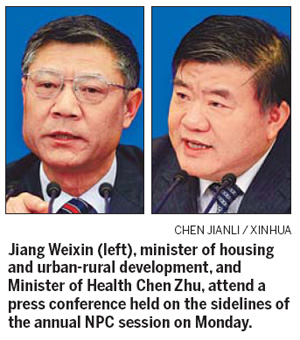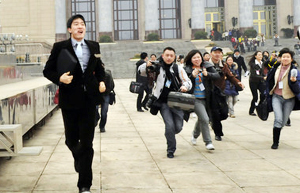Despite efforts, housing prices continue to rise
By SHAN JUAN (China Daily)
Updated: 2010-03-09 07:18

BEIJING: China will face considerable pressures caused by increasing housing prices in the next 20 years as a hefty demand for housing will persist amid the nation's accelerated urbanization and industrialization, a senior official said on Monday.
"Demand is big, while land supply is limited. So pressures caused by rising prices are still mounting," said Jiang Weixin, minister of housing and urban-rural development at a press conference held on the sidelines of the annual NPC session.
However, the central government is determined to curb runaway housing prices, he said.
Jiang acknowledged that hefty land-transfer fees, which have become a major source of revenue for local governments, are partly to blame for the soaring house prices. But the increasing housing retail prices also add pressure and require more efforts by local governments to maintain social stability.
Driven by record bank lending and favorable property tax policies, China saw a sharp residential property price hike nationwide last year, triggering heated public complaints and fears of possible asset bubbles.
As the annual session of China's top legislature opened, Premier Wen Jiabao on Friday reiterated his determination to curb the excessive growth of house prices in major cities while satisfying people's basic needs for housing.
A total of 63.2 billion yuan ($9.25 billion) will be spent by the central government on low-income housing in 2010, an increase of 8.1 billion yuan, or 14.7 percent over last year, Wen said.
The government also will build 3 million affordable houses and renovate 2.8 million shanty ones, he said.
Jiang said the government would increase the amount of affordable housing and crack down on housing developers who hoard land and apartments to drive up prices.
With these efforts, "the housing prices will rise in a reasonable and stable way this year as demand is huge," he said.
However, some argued that those initiatives would not work well to tackle the problem at its root given that land sales are the biggest revenue source for governments.
Governments at various levels received 1.6 trillion yuan from land sales in 2009, accounting for roughly 4.7 percent of last year's GDP, statistics from the Ministry of Land and Resources showed. Sales revenue from the housing sector increased by 63 percent over 2008.
Nationwide, local governments cashed in big on land sales, with the major cities of Hangzhou, Shanghai and Beijing being the top three, according to the China Real Estate Index.
"We've noticed that trend particularly with local authorities. In my opinion, it's a two-sided question," he said.
"Local governments will be happy with higher land prices, but they must also be concerned about potential social instability prompted by high house prices," he said. "They'd better think over the issue carefully."
Medical reform
At the same press conference, Minister of Health Chen Zhu said that under the ongoing medical reform, the government has invested heavily to revamp the country's problem-ridden health care system, which featured a market orientation in the past three decades.
Despite that, governments at both central and local levels should invest more into the health sector, Chen said.
Currently, only 25 percent of the overall medical cost in the country is shouldered by the government, while that figure is 46 percent in the US and 56 percent in neighboring Thailand.
"It's about governance mentality," he said.
"For economic projects, local governments never hesitate to invest heavily. When it comes to the health sector, why is it so difficult and why is there reluctance?" he said.
"Definitely, investing in health is not 'burning money.' It's strategic investment for the nation's future and a core part of a social safety network for maintaining social stability and high-speed economic growth," he said.
Within the year, annual insurance for each participant of the New Rural Cooperative Medical Plan - a health insurance policy introduced in 2003 that has so far covered more than 94 percent of the rural population - is expected to reach 300 yuan, more than double the current average 113 yuan in the nation, he said.
Apart from the plan, other measures will include establishing an essential drug system to regulate drug use and lower drug costs.








